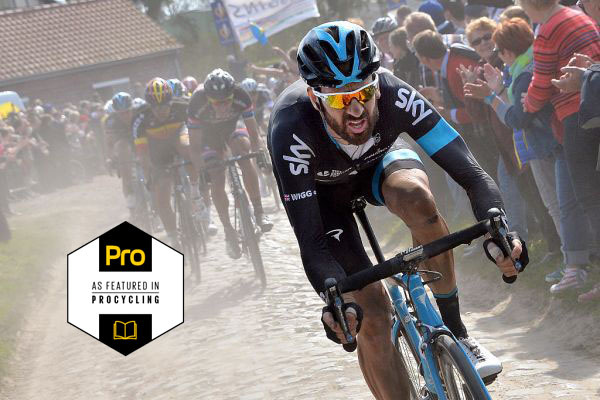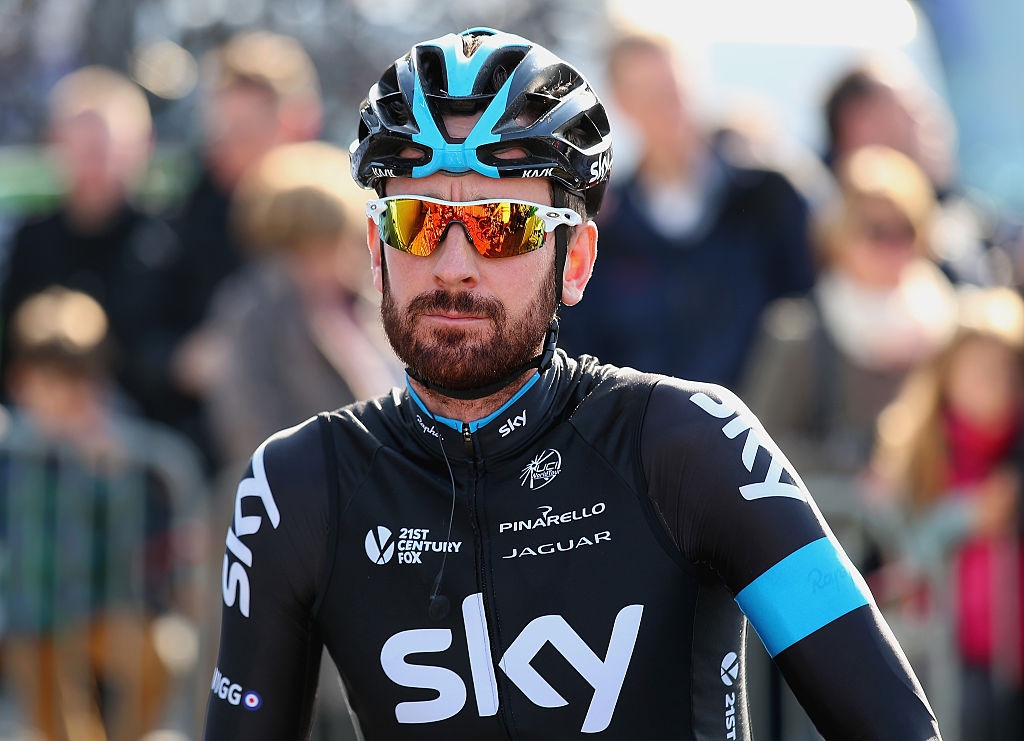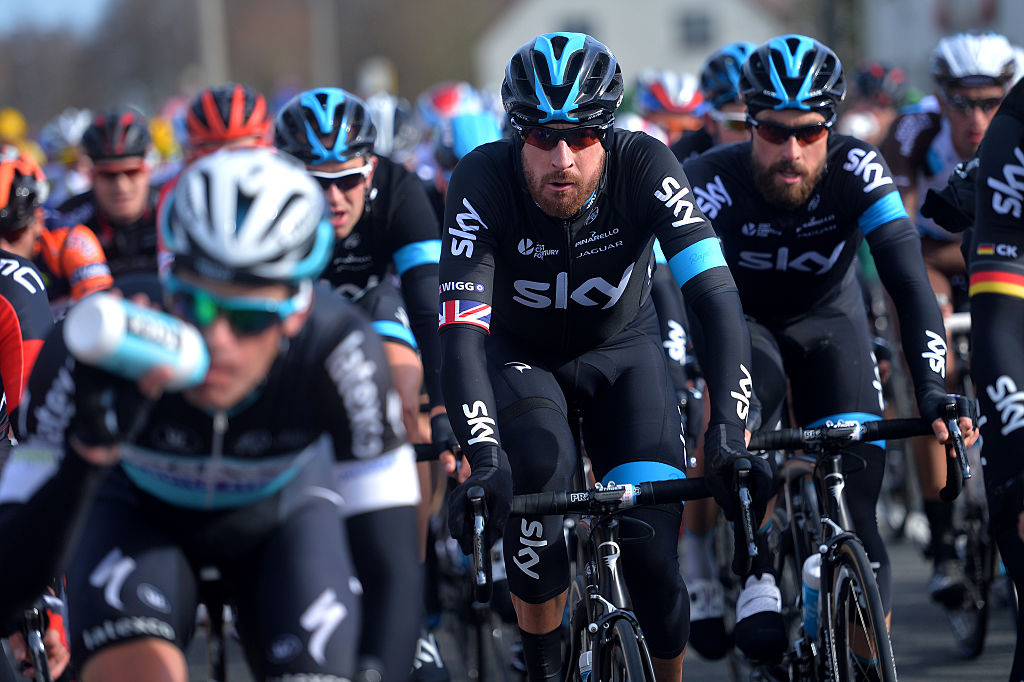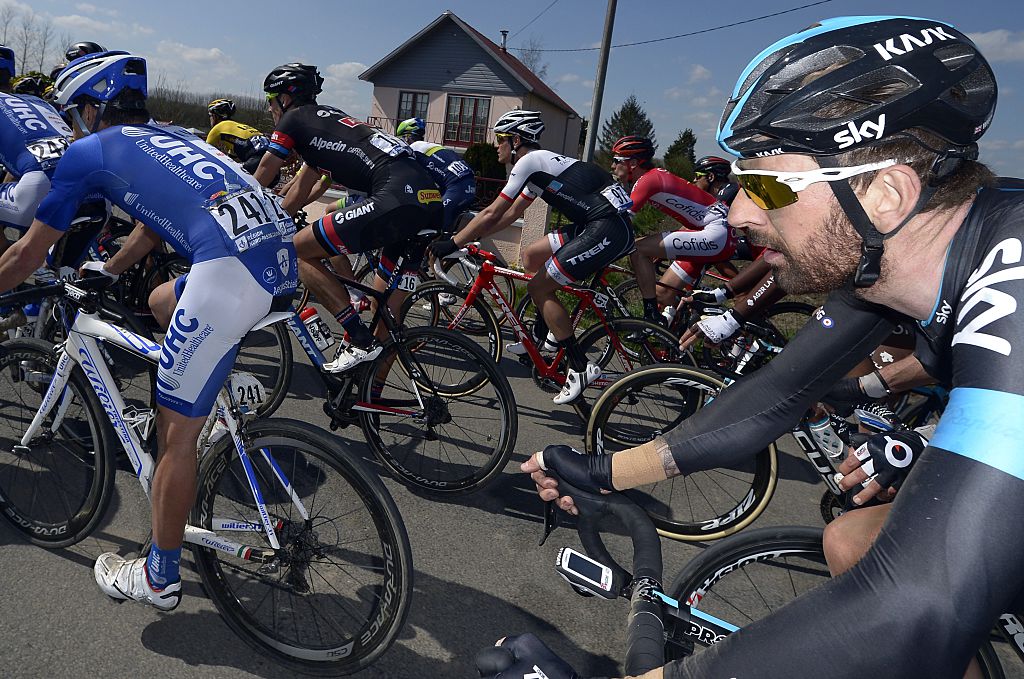Bradley Wiggins: End of the road
The 2012 Tour de France champion readies himself for the end of his career as a WorldTour rider at the 2015 Paris-Roubaix

Procycling magazine: the best writing and photography from inside the world's toughest sport. Pick up your copy now in all good newsagents and supermarkets, or get a Procycling subscription.
Bradley Wiggins may not have bowed out in the Team Sky jersey with a dream win at Paris-Roubaix, which he said at one point would have been "bigger than the Tour" if he could have won it, but his six-week swansong between the Omloop Het Nieuwsblad and 'The Hell of the North' gave ample opportunity to see the many sides of his persona and why he has become such a fan favourite.
This article appeared in Procycling magazine issue 204 in 2015
You never quite know which Bradley Wiggins you're going to get, partly because Bradley Wiggins is so many different things to so many different people. In France, he is 'La Rock Star' – collector of guitars and devotee of Paul Weller. In Italy, he is 'Il Baronetto' – knight of the realm and emblem of England and all things English.
In his home country, he is, simply, 'Wiggo' – an almost caricatured amalgam of sideburns and pithy humour.
One constant, however, is capriciousness. When Wiggins was running over half an hour late for a roundtable interview on the eve of the Omloop Het Nieuwsblad in February – the formal beginning of his build-up to Paris-Roubaix – some of the reporters waiting in the cramped drawing room of Kortrijk's Hotel Messeyne began to suspect that they might have to find different ways to fill column inches in the next morning's newspapers. Others debated cutting their losses and making for the BMC press conference being held around the corner.
Wiggins sidled into the room moments later, bringing the hushed small talk to an end, and the reporters huddled around. Dressed in a Team Sky tracksuit, he betrayed a certain discomfort as he answered the first questions sitting upright, wringing his hands as he spoke, before gradually slumping into his chair and relaxing into his role as raconteur.
The latest race content, interviews, features, reviews and expert buying guides, direct to your inbox!
In Belgium, fortunately, Wiggins is his 14-year-old self, a cycling obsessive, and he obliged by jumping through the usual hoops, showing off his encyclopaedic knowledge of Paris-Roubaix finales past and sharing anecdotes from his early brushes with the cobbles as a young professional.
The short conference ended with Wiggins breaking into a soliloquy on different sprint tactics in the Roubaix velodrome, comparing and contrasting Steve Bauer's 1990 defeat to Eddy Planckaert with Magnus Backstedt's 2004 victory in minute detail.
"I've got a photographic memory for shit, so I do remember odd stuff like that," Wiggins told a charmed local reporter.

A little earlier, Wiggins had touched upon one of the recurring themes of his spring, namely how life with Sky's Classics unit was infinitely more pleasant than the rather more sombre business of winning the Tour de France and cohabiting with Chris Froome that used to be his lot.
"Everyone's on edge constantly – it's an intense environment being on the Tour de France with the pressures of the media every day," he said. "It's a lot more enjoyable here."
The following day, Wiggins spent much of the afternoon sitting on the front of the peloton, riding in support of Ian Stannard. Relative to 12 months previously, when he didn't race on the cobbles at all until April, he seemed more advanced in his preparation for Paris-Roubaix – his final crusade as a Sky rider.
His team, too, appeared to have progressed, and Stannard crowned an assured showing by somehow seeing off a trio of Etixx-Quick Step riders in the winning break to land his second-successive Omloop victory.

At the finish, directeur sportif Servais Knaven held court outside the team bus, repeating in Dutch and English just how Sky had pulled off such a heist. Other players, such as Luke Rowe, gladly recounted their roles in Stannard's win. Wiggins, however, simply propped his bike against the bus on arrival and clambered wordlessly aboard.
As darkness fell softly over Ghent's Sint-Pietersplein, a couple of reporters waited for him to re-emerge, more in hope than expectation. Half an hour later, the doors slammed shut, the engine burst into life and the bus pulled away. You never do know which Bradley Wiggins you're going to get.
'When he's not in the mood, then everything starts to annoy him'
When Wiggins missed the E3 Harelbeke in late March, his next scheduled cobbled race, Sky cryptically announced that his omission was down to the team's "race selection policy". A Kremlinologist would struggle to decipher some of the missives issued by the team's press czars over the years, but Wiggins, increasingly keen to portray himself as non-fluent in Sky-Speak, was happy to lift the smokescreen and explain why when he lined up at Gent-Wevelgem two days later.
"I decided to sack Friday off more for precaution than anything else," Wiggins said as he sheltered from the rain in an underpass before the start in Deinze, later adding: "I was a bit sick at the start of last week and the team didn't want to say anything. God knows why."
He would last barely 100 kilometres of a windswept Gent-Wevelgem, opting out just as the extreme gusts began to blow riders as robust as Gert Steegmans off the road and into the ditch. Wiggins being Wiggins, his early abandon provided further succour for those wondering if he truly had the appetite of a Paris-Roubaix contender. But, 48 hours later, he was confidently nudging his way to the front of the peloton in a white-knuckle finale at the Driedaagse De Panne.
"When he's not in the mood, then everything starts to annoy him and he shies away, but he can fight with his elbows when he's up for it," his former team-mate Jacky Durand said.
Off the bike, too, Wiggins cut an unperturbed figure at De Panne, relaxed enough to speak at length with reporters on the start line in Zottegem on stage 2, mulling over everything from Geraint Thomas's chances of winning the Tour of Flanders to his own retirement-by-instalments.
"You automatically start to count down," he admitted. "You try not to, but of course everyone reminds you constantly."
There was certainly a valedictory feel about Wiggins's victory in the final time trial the following day – his first win in the rainbow jersey of world champion in the discipline, and most likely his last, at least at this level. The 14-kilometre test along the North Sea coast was not so much an intermediate leg on the road to Roubaix as the closing of a different parenthesis.
"It was one of my first time trials as a professional back in 2002," Wiggins explained. "It was certainly on my mind all week and especially today: I really wanted to win this one."
Museeuw: It's an honour that someone like Bradley Wiggins wants to win Paris-Roubaix before he stops his career
Somewhere between Flanders and Paris-Roubaix, there was a discernible change in mood. An exasperating outing at the Ronde, where Wiggins suffered a banal fall early on and made no impression on the race, certainly didn't help, but there was a sense, too, that he was beginning to grapple with the finality and the magnitude of the occasion.
On the Tuesday, for instance, Wiggins was visited at the Sky hotel by Johan Museeuw – the very man he used to imitate on the cobbled mews near his home on after-school rides in the 1990s. Of course, the Belgian had come for the photo op, but also to pay homage.
"For us Classics riders, it's an honour that someone like Bradley Wiggins wants to win Paris-Roubaix before he stops his career," Museeuw said. For a moment, perhaps, Wiggins was the wide-eyed kid from Kilburn all over again.
The following day in Antwerp, as he went to sign on ahead of Scheldeprijs, Wiggins waved away requests for an interview from the Sporza television crew. Given his previous loquaciousness during his Classics campaign, they assumed this to be faux reticence, another manifestation of what they like to call his 'British humour'.
That impression seemed to be confirmed when Wiggins hammed it up on the rostrum by hugging speaker Michel Wuyts after he noted that it might be their last-ever meeting – "Maybe I'll see you in heaven," Wiggins said – but he brushed them off again when he descended from the dais.
He rode impassively to the start line and buried himself in the body of the peloton, far from prying microphones.
It was left instead to Stannard and Thomas to speak on his behalf. If they were amused by the troupe of reporters left flat-footed by Wiggins, they hid their mirth discreetly.
"Brad's made it quite clear that he wants to be the leader and win that race so it's quite geared towards him," Stannard said as he slouched on his top-tube, although Thomas noted that the hierarchy was not quite as strictly defined as the media narrative demanded.
"We've got a few cards to play," he said.
'I need to focus on the race and not keep thinking about all the nostalgic parts of it'
On the Friday before Paris-Roubaix, an expanded party of mainstream British press landed in Kortrijk to begin documenting the final act of Wiggins's Sky career, but they arrived at the Hotel Messeyne to disquieting news: 'Wiggo' wasn't playing ball. Rather than speak at the press conference as scheduled, they were told, Wiggins simply wanted to focus on the race.
Standing on the pavement outside the overflowing lobby, Sky press officer Rob Jorgensen tried to placate the increasingly restless group laying siege to the hotel, while Wiggins sat upstairs in his room, alone in a Troy of his own making. Twenty minutes later, when Wiggins had finally been coaxed into talking, it took a while for him to hit his stride in the small conference room at the rear of the hotel. Wrapped in a plain-black jacket and with a woolly hat slung low over his forehead, he appeared distracted and even nervous during the opening questions.
The reason for his unease became apparent when a television crew invited him to reflect on the fact that Sunday would mark the end of his road career at the highest level.
"I'm trying not to think about that. It's becoming quite negative now. I'm not enjoying it," Wiggins said. "I need to focus on the race and not keep thinking about all the nostalgic parts of it. It makes the job even harder."
Unusually for a man of on the verge of retirement (of sorts), Wiggins was more comfortable speaking in the future tense, reckoning that he was better prepared than he had been for his ninth-place finish the previous year, although he was careful to add a caveat: "If it was a time trial, I could win it – but it's not. You can be in the best possible shape and finish last in Roubaix."
By the end of the 10-minute conference, Wiggins had talked himself into a better mood, finding time to poke fun at his team's special new bikes – "They're game-changing, apparently," he sniffed – and lob another barb in the direction of Froome et al, by decreeing that riding on Sky's Tour team was "miserable" in comparison with the Classics squad.
When a French reporter made a forlorn attempt to have Wiggins recount his veneration for Paris-Roubaix in full one last time, he was at least rebuffed with good humour.
"I'd be here all night if I went into it again. Just Google: 'Bradley's love of Paris-Roubaix'," Wiggins said with mock exasperation.
Another 'Wiggo' show, in spite of himself.
'I just kissed Dave on the head'
"Every true story has an anti-climax," John Updike wrote when describing baseball great Ted Williams's final appearance for the Boston Red Sox in 1960. Teddy Ballgame at least had the consolation of hitting a home run in his last at bat at Fenway Park; Wiggins had to settle for a brief foray off the front at Paris-Roubaix with a shade over 30 kilometres to race.
Nearing the end of pavé sector 7 at Templeuve, Wiggins powered out of the group of favourites and across to earlier escapee Stijn Vandenbergh. They were soon joined by Zdenek Štybar and Jens Debusschere. For a few delirious moments, the fairytale ending beckoned, only for a lack of collaboration to doom the attack before they even reached the next section of cobbles.
The quest to win Paris-Roubaix effectively ended there. By the time Wiggins accelerated again in the final five kilometres, John Degenkolb's winning move had already disappeared up the road.

Wiggins's wife, Cath, was standing among the journalists waiting in the centre of the Roubaix velodrome, drawing their attention as she screamed encouragement at the big screen, but her voice was lost when the crowds in the stands rose to herald the arrival of the leaders.
Wiggins came home in 18th place, rolling to a halt inside the track and seeking refuge beneath a canopy emblazoned with Vittel logos, while frustrated camera crews jostled for position outside.
After unclipping his helmet, he ran a hand through his hair and sat on the grass, eyes hidden by reflective shades. He was soon joined by his team-mate Luke Rowe, Sky's best finisher in eighth. Haunted faces say more than words after a day in Hell, and they shared the makeshift oasis in near silence, their muddied legs spread before them.
Cath Wiggins was ushered through to speak to her husband and she wiped away a tear as she emerged, but Wiggins himself was inscrutable when he soft-pedalled out of the velodrome soon afterwards, a retinue of reporters jogging in tow like a presidential guard. They accompanied him as far as the cordon outside the Sky bus a couple of blocks away, and then stood waiting in the pleasant spring sunshine after he climbed aboard.
Forty minutes later, Wiggins reappeared on the steps of the team bus as a man transfigured. He had washed off the grime of the pavé, of course, but his bearing was decidedly lighter, too, as though relieved of an unseen burden. At least in public, the welter of emotions provoked by the occasion were now firmly in check, as manager Dave Brailsford playfully draped an arm around his shoulders for the benefit of a Sky News camera crew before disappearing back onto the bus.
"I just kissed Dave on the head and told him we've gone through a lot together," Wiggins said. "He's known me since I was an 18-year-old streak of piss, and now I'm a 35-year-old streak of piss."
'I've won the Tour, haven't I?'
The short media scrum that followed felt marked by a tension between those looking for sound-bites from 'Wiggo' the caricature and those seeking analysis from Wiggins the cyclist. He did his best to please both constituencies. A question involving the words "knees-up" was drowned out by a more earnest inquiry about his late acceleration.
"By then it's like that bit in Titanic, where they're all hanging on and people are just falling," Wiggins said.
In the build-up to Paris-Roubaix, Wiggins had declared that he would swap his Tour de France victory for a win in the famous old velodrome, and he was reminded of that statement when a reporter asked if he was tempted to renege on his road retirement and return to the cobbles for one final tilt in 2016.
Wiggins tilted his head, his mouth curled into a half-smile.
"No," he said softly. "I've won the Tour, haven't I?"
Procycling magazine: the best writing and photography from inside the world's toughest sport. Pick up your copy now in all good newsagents and supermarkets, or get a Procycling print or digital subscription, and never miss an issue.
Follow @Procycling_mag on Twitter.

Barry Ryan was Head of Features at Cyclingnews. He has covered professional cycling since 2010, reporting from the Tour de France, Giro d’Italia and events from Argentina to Japan. His writing has appeared in The Independent, Procycling and Cycling Plus. He is the author of The Ascent: Sean Kelly, Stephen Roche and the Rise of Irish Cycling’s Golden Generation, published by Gill Books.